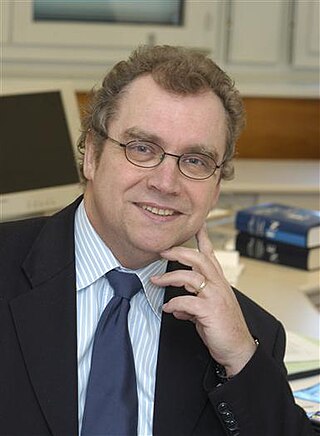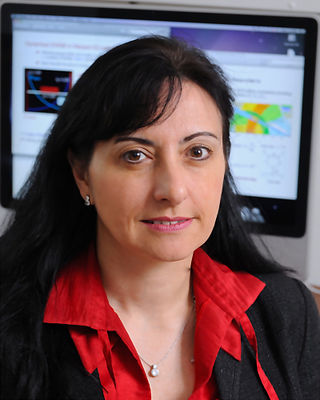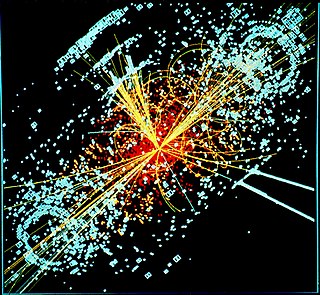
Walther Wilhelm Georg Bothe was a German nuclear physicist, who shared the Nobel Prize in Physics in 1954 with Max Born.

The Max Planck Institute for Physics (MPP) is a physics institute in Munich, Germany that specializes in high energy physics and astroparticle physics. It is part of the Max-Planck-Gesellschaft and is also known as the Werner Heisenberg Institute, after its first director in its current location.
The Max-Planck-Institut für Kernphysik is a research institute in Heidelberg, Germany.

Maria Spiropulu is a Greek particle physicist. She is the Shang-Yi Ch'en Professor of Physics at the California Institute of Technology.

Prof. dr. Joseph Johannus (Jos) Engelen, a Dutch physicist, was Chairman of the Netherlands Organisation for Scientific Research (NWO) from January 2009 to October 2016.

Herwig Franz Schopper is a Czech-born experimental physicist and was the director general of CERN from 1981 to 1988.

Marcela Silvia Carena Lopez is a theoretical physicist, and Distinguished Scientist at the Fermi National Accelerator Laboratory in Batavia, Illinois, where she is also head of the lab's Theory Division. She is also a professor at the University of Chicago, where she is a member of the Enrico Fermi Institute and the Kavli Institute for Cosmological Physics.

Rolf-Dieter Heuer is a German particle physicist. From 2009 to 2015 he was Director General of CERN and from 5 April 2016 to 9 April 2018 President of the German Physical Society. Since 2015 he has been Chair of the European Commission's Group of Chief Scientific Advisors, and since May 2017 he has been President of the SESAME Council.
Wolfgang Gentner was a German experimental nuclear physicist.

The safety of high energy particle collisions was a topic of widespread discussion and topical interest during the time when the Relativistic Heavy Ion Collider (RHIC) and later the Large Hadron Collider (LHC)—currently the world's largest and most powerful particle accelerator—were being constructed and commissioned. Concerns arose that such high energy experiments—designed to produce novel particles and forms of matter—had the potential to create harmful states of matter or even doomsday scenarios. Claims escalated as commissioning of the LHC drew closer, around 2008–2010. The claimed dangers included the production of stable micro black holes and the creation of hypothetical particles called strangelets, and these questions were explored in the media, on the Internet and at times through the courts.

The Abdus Salam Centre for Physics, is a federally-funded research institute and national laboratory site managed by the Quaid-i-Azam University for the Ministry of Energy (MoE) of the Government of Pakistan.
Klaus Blaum is a German physicist and director at the Max Planck Institute for Nuclear Physics in Heidelberg, Germany.
Manfred Lindner is a German physicist and director at the Max Planck Institute for Nuclear Physics in Heidelberg, Germany. He conducts basic research in particle and astro-particle physics.

Sir Tejinder Singh Virdee,, is a Kenyan-born British experimental particle physicist and Professor of Physics at Imperial College London. He is best known for originating the concept of the Compact Muon Solenoid (CMS) with a few other colleagues and has been referred to as one of the 'founding fathers' of the project. CMS is a world-wide collaboration which started in 1991 and now has over 3500 participants from 45 countries.

Peter Jenni, is an experimental particle physicist working at CERN. He is best known as one of the "founding fathers" of the ATLAS experiment at the CERN Large Hadron Collider together with a few other colleagues. He acted as spokesperson of the ATLAS Collaboration until 2009. ATLAS is a world-wide collaboration which started in 1992 involving roughly 3,000 physicists at 183 institutions in 38 countries. Jenni was directly involved in the experimental work leading to the discoveries of the W and Z bosons in the 1980s and the Higgs boson in 2012. He is (co-)author of about 1000 publications in scientific journals.

Paolo Giubellino is an experimental particle physicist working on High-Energy Nuclear Collisions. Currently he is the joint Scientific Managing Director of the Facility for Antiproton and Ion Research (FAIR) and the GSI Helmholtz Centre for Heavy Ion Research (GSI) and Professor at the Institute of Nuclear Physics of the Technische Universität Darmstadt.
Hans Joachim Specht is a German experimental particle and nuclear physicist and university professor at the Heidelberg University.

Johanna Barbara Stachel is a German nuclear physicist. She is a professor in experimental physics at the University of Heidelberg. Stachel is a former president of the German Physical Society (DPG).
Francis Louis Halzen is a Belgian particle physicist. He is the Hilldale and Gregory Breit Distinguished Professor at the University of Wisconsin–Madison and Director of its Institute for Elementary Particle Physics. Halzen is the Principal Investigator of the IceCube Neutrino Observatory at the Amundsen–Scott South Pole Station in Antarctica, the world's largest neutrino detector which has been operational since 2010.
Laura Baudis (1969) is a Romanian-born German particle astrophysicist. She is employed as a full professor by the University of Zurich, Switzerland. Her research focuses on dark matter and neutrino physics. She is a member of the science strategy team for XENON as well as the CERN Scientific Policy Committee (2016–18) and the PSI Research Committee for Particle Physics.












